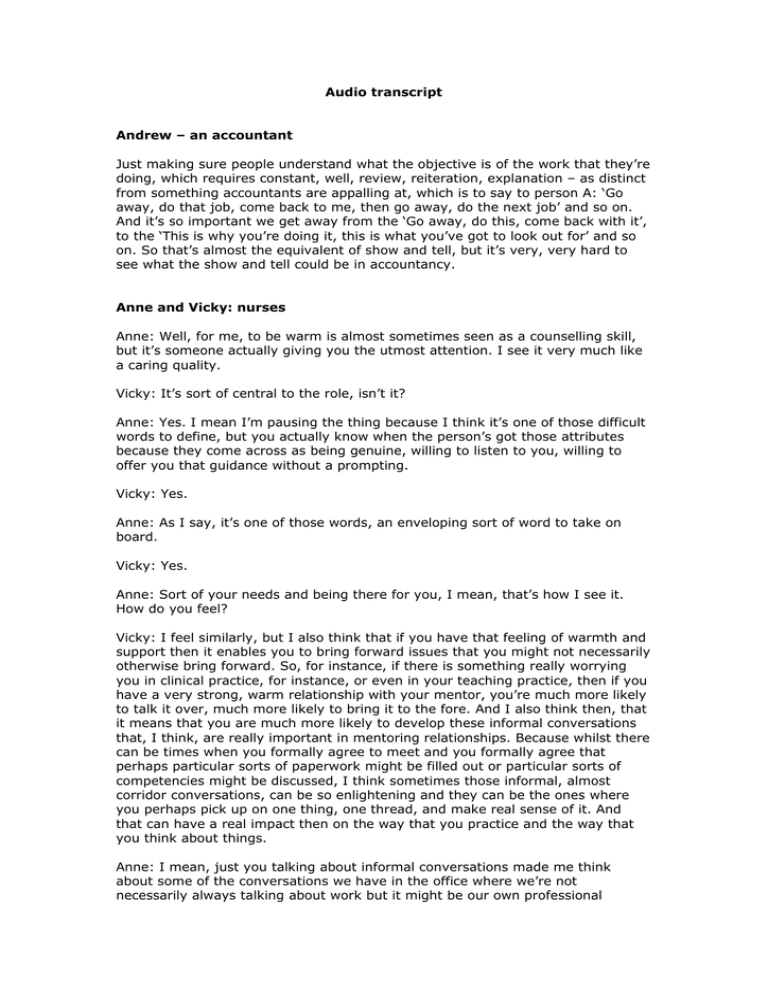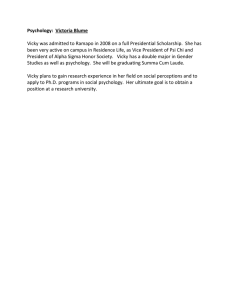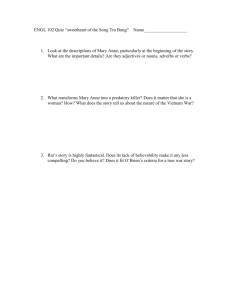Audio transcript Andrew – an accountant Just making sure people
advertisement

Audio transcript Andrew – an accountant Just making sure people understand what the objective is of the work that they’re doing, which requires constant, well, review, reiteration, explanation – as distinct from something accountants are appalling at, which is to say to person A: ‘Go away, do that job, come back to me, then go away, do the next job’ and so on. And it’s so important we get away from the ‘Go away, do this, come back with it’, to the ‘This is why you’re doing it, this is what you’ve got to look out for’ and so on. So that’s almost the equivalent of show and tell, but it’s very, very hard to see what the show and tell could be in accountancy. Anne and Vicky: nurses Anne: Well, for me, to be warm is almost sometimes seen as a counselling skill, but it’s someone actually giving you the utmost attention. I see it very much like a caring quality. Vicky: It’s sort of central to the role, isn’t it? Anne: Yes. I mean I’m pausing the thing because I think it’s one of those difficult words to define, but you actually know when the person’s got those attributes because they come across as being genuine, willing to listen to you, willing to offer you that guidance without a prompting. Vicky: Yes. Anne: As I say, it’s one of those words, an enveloping sort of word to take on board. Vicky: Yes. Anne: Sort of your needs and being there for you, I mean, that’s how I see it. How do you feel? Vicky: I feel similarly, but I also think that if you have that feeling of warmth and support then it enables you to bring forward issues that you might not necessarily otherwise bring forward. So, for instance, if there is something really worrying you in clinical practice, for instance, or even in your teaching practice, then if you have a very strong, warm relationship with your mentor, you’re much more likely to talk it over, much more likely to bring it to the fore. And I also think then, that it means that you are much more likely to develop these informal conversations that, I think, are really important in mentoring relationships. Because whilst there can be times when you formally agree to meet and you formally agree that perhaps particular sorts of paperwork might be filled out or particular sorts of competencies might be discussed, I think sometimes those informal, almost corridor conversations, can be so enlightening and they can be the ones where you perhaps pick up on one thing, one thread, and make real sense of it. And that can have a real impact then on the way that you practice and the way that you think about things. Anne: I mean, just you talking about informal conversations made me think about some of the conversations we have in the office where we’re not necessarily always talking about work but it might be our own professional development. When I was doing my proposal, you know, for my research and I had to change my topic altogether and I was almost rehearsing the things I was going to write down and even though – I don’t know if we call it mentoring – but I’m very aware that you are senior to me within our team and sometimes I do actually come to you and ask you for that advice and support even though it’s very much in an informal process and we sort of mull over ideas together. So even in the formal it’s very much about doing things together.



